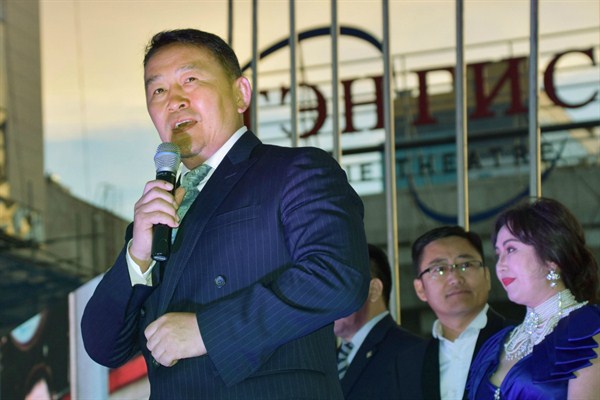Just moments after he was sworn in as Mongolia’s fifth democratically elected president earlier this week, Khaltmaa Battulga turned his attention to international affairs. Having just won the second-round runoff, the business tycoon-turned-president met with Russian, Chinese and Japanese delegations in Mongolia’s capital, Ulaanbaatar. Diplomacy is one of the most important responsibilities assigned to the Mongolian president by the country’s constitution. Managing foreign relations with Mongolia’s immediate neighbors, while also building on his predecessor’s legacy of heightened visibility beyond Northeast Asia, will be a central challenge for Battulga.
Battulga succeeded Tsakhiagiin Elbegdorj, who served two terms as president and whose diplomatic achievements overshadow the tumultuous path that domestic politics have taken in recent years in mineral-rich Mongolia, which has been hit hard by the plunge in global commodities prices. While both Battulga and Elbegdorj are members of the Democratic Party, they have clashed in the past, particularly over Battulga’s seemingly condescending attitude toward China, the major source of investment in the country and virtually the only customer for its copper and coal exports.
The presidential election campaign was an ugly affair more notable for the mud-slinging between candidates than any substantive policy discussions. Nevertheless, Battulga’s victory was somewhat of a surprise as his opponent in the runoff was Miyegombyn Enkhbold, leader of the Mongolian People’s Party, or MPP, which had trounced the Democratic Party in last year’s parliamentary election. Foreign policy only appeared in insinuations during the campaign. Battulga frequently hinted at Enkhbold’s supposed Chinese ancestry, while Enkhbold struck back with mentions of Battulga’s Russian wife—tactics in each case designed to smear the other candidate in the eyes of their supporters. It was not the level of presidential debate that one would wish upon any country, though perhaps not entirely unfamiliar after the 2016 U.S. presidential race. Battulga even ran on an expressly nationalistic platform familiar to American voters: “Mongolia First.”

